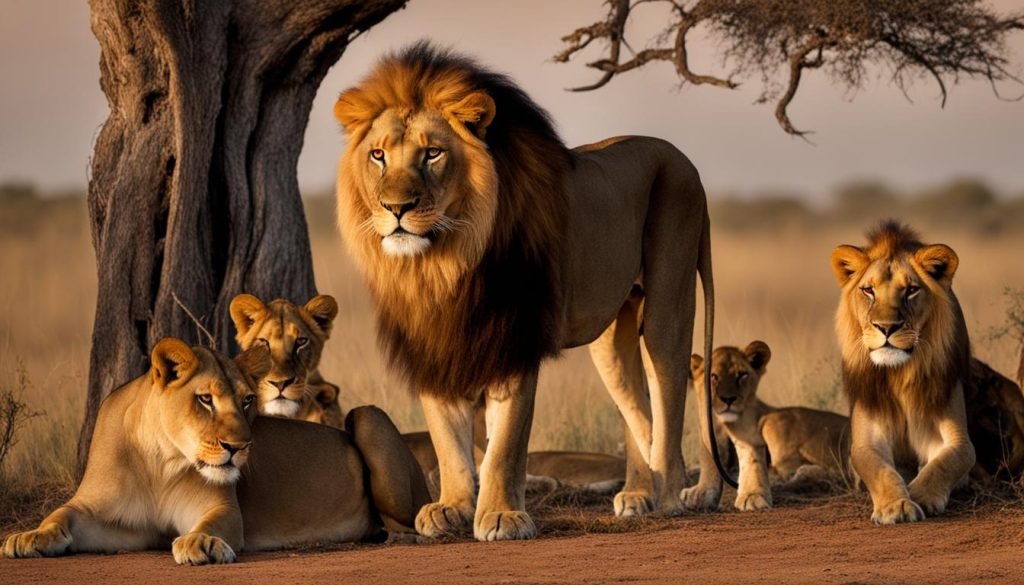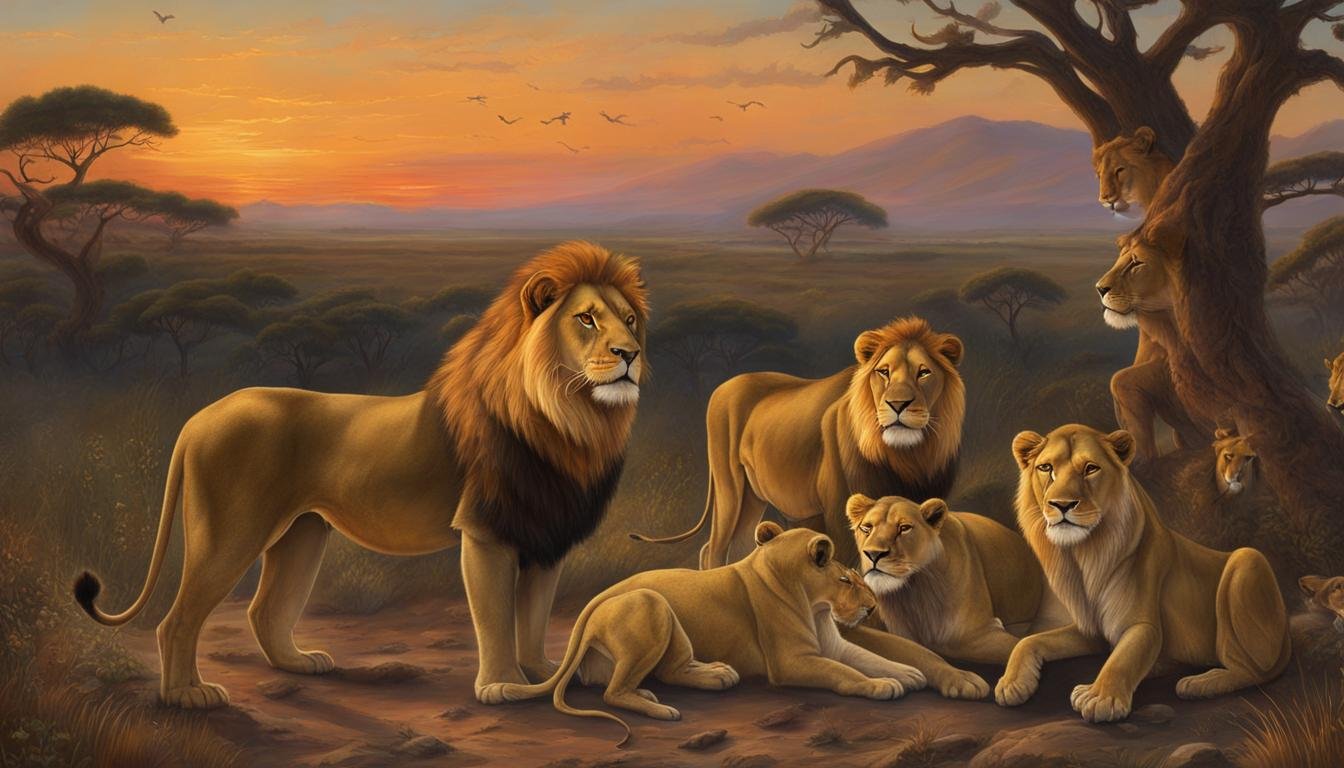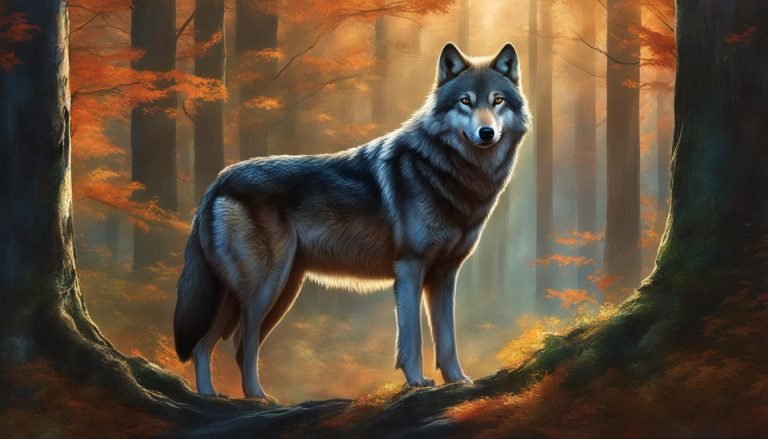How Long Do Lions Live? Wild vs Captivity
Lions are fascinating creatures that have captured the attention of people for centuries. They are known for their majestic appearance, powerful roar, and impressive hunting skills. However, have you ever wondered how long these incredible animals can live?
The average lifespan of lions can vary depending on various factors such as habitat, diet, and social structure. In this section, we will explore the question of a lion’s lifespan and examine some of the factors that affect the longevity of these magnificent creatures.
Key Takeaways:
- Lions’ lifespan can be influenced by numerous factors including habitat, diet, and social structure.
- The average lifespan of lions can vary in the wild and captivity.
- Conservation efforts play a crucial role in protecting lion populations and securing their future.
Lion Quiz
How well do you know Lions? Test your knowledge below!

Understanding the Lion Aging Process

Lion cubs are born after a gestation period of about 3 and a half months. At birth, they weigh around 1.5 kg and are blind, helpless, and heavily reliant on their mother’s milk. The lioness protects and nurtures her cubs, teaching them how to hunt and survive in the wild.
As lions grow older, they go through various stages of development. Cubs become juveniles by the age of two, gaining independence and learning to hunt on their own. By the time lions reach four years of age, they are considered adults, fully grown and self-sufficient.
However, the aging process continues, and as lions age, they may experience physical and cognitive decline. This may lower their ability to hunt, protect themselves, and engage in social activities with other lions. Injured or weakened lions also face a higher risk of predation or starvation, further contributing to a decline in their lifespan.
Overall, the lion’s aging process is characterized by various changes in their physical appearance, behavior, and social status. Understanding the different stages of lion life can help us appreciate these magnificent creatures and provide better care for them.
Factors Affecting the Lion Lifespan

The lifespan of lions is influenced by various factors that contribute to their longevity and are vital to their survival. These include:
| Factors | Description |
|---|---|
| Habitat | Lions require vast territories to hunt, breed, and roam. Changes in their natural habitats due to human activities, such as urbanization, agriculture, and deforestation, can disrupt their lifestyle and threaten their lives. |
| Diet | Lions primarily feed on large herbivores, such as buffalo, zebras, or antelopes. Their diet affects their health, strength, and resistance to diseases. Hunting success rates and scavenging opportunities also shape lions’ food intake. |
| Territorial disputes | Lions are social animals that form prides consisting of females, cubs, and one or more adult males. Establishing and defending territories, interacting with other prides, and mating impact the lion’s stress levels, health, and overall lifespan. |
| Climate | Lions live in diverse environments, from savannas to deserts and mountains. Changes in temperature, precipitation, and weather patterns affect their hydration, energy balance, and thermal regulation. |
| Human activities | Lions face multiple threats from human activities, such as poaching, trophy hunting, habitat fragmentation, and human-wildlife conflicts. These activities reduce their population size, genetic diversity, and access to resources. |
Other factors that may impact lion lifespan include genetic variability, disease prevalence, predation by other carnivores, and individual differences in behavior and adaptation.
Understanding these factors is crucial to ensuring the conservation and protection of lions and their habitats.
How Long Do Lions Live: The Average Lifespan of Lions

Despite being powerful predators, lions face numerous challenges that can impact their longevity. The average lifespan of lions varies depending on their habitat, gender, and many other factors, leading to differences between lions living in the wild and those in captivity.
In the wild, lions typically live between 10 and 14 years, with females living slightly longer than males. However, this survival rate can vary depending on various environmental and biological factors.
| Factor | Wild Living Lions | Lions in Captivity |
|---|---|---|
| Natural Predators | High | Low |
| Human Threats | High | Low |
| Availability of Food & Water | Seasonal fluctuations | Consistent supply |
| Health Issues | Various diseases, infections, and injuries | Regular medical checkups and treatments |
In captivity, lions generally live longer than their wild counterparts, with some individuals reaching their late teens or even early twenties. This is because they are protected from natural predators and have access to regular health checkups and treatments. However, captivity can also pose challenges, including limited space, unnatural diets, and stress due to social isolation.
While lions can live for many years in captivity, it is essential to note the importance of their conservation in the wild. Human activities such as habitat loss, hunting, and poaching have led to a decline in the lion population, making it crucial to implement strategies to protect and preserve these magnificent creatures.
Comparing Lion Lifespan in the Wild and Captivity
Lions are fascinating creatures that capture our imagination with their fierce, majestic presence. However, their lifespan can vary depending on whether they live in the wild or in captivity. Let’s take a closer look at the differences between the two.
In the wild, lions face numerous challenges that can impact their lifespan. They must hunt for their food, protect their territory from rivals, and avoid dangers such as predators and disease. As a result, the average lifespan of a lion in the wild is around 10-14 years.
On the other hand, lions in captivity generally have a longer lifespan. They are fed regularly, receive medical attention when needed, and are protected from many of the dangers their wild counterparts face. As a result, they can live up to 20 years or more.
Despite the longer lifespan in captivity, it’s worth noting that some lions can suffer from health problems related to their living conditions. Obesity, dental issues, and other problems can arise from lack of exercise and a diet that is not similar to what they would have in the wild. Therefore, it is important to carefully manage their diet and living conditions to ensure they live as healthy and fulfilling lives as possible.
The impact of habitat and human activity
The habitat in which lions live can also have a significant impact on their lifespan. For example, lions that live in protected areas such as national parks may have a similar lifespan to those in captivity due to being safe from human activity, diseases, and violence that they may encounter in unprotected areas.
On the other hand, lions living outside of protected areas may face many threats from human activity such as poaching, cattle grazing, and habitat destruction, leading to a shorter lifespan. For example, in some regions of Africa, lion populations have declined by up to 50% in the past few decades, largely due to human activities.
“Lions play a crucial role in the ecosystem, and their decline is indicative of broader problems facing African wildlife and their habitats,” says Dr. Jane Goodall.
Understanding the factors that contribute to lion lifespan can help us make informed decisions about how to protect and conserve these animals. By focusing on conservation efforts, we can ensure that lions have a bright and healthy future, both in the wild and in captivity.
Longevity Records and Exceptional Cases

While the average lion’s lifespan is around 10-14 years, there have been rare cases of exceptional longevity. The oldest lion on record lived for an impressive 29 years and was a female named Elsa. She became world-famous after starring in the movie “Born Free” and went on to live another nine years after its release.
A male lion called C-Boy from the Serengeti National Park in Tanzania also set a record for exceptional longevity. In 2016, he was reported to be the oldest known lion in the area, estimated to be between 25-30 years old. Despite his advanced age, C-Boy was still holding his territory and siring cubs.
These exceptional cases illustrate the potential for lions to live well beyond their average lifespan and demonstrate the importance of lion conservation efforts aimed at protecting these incredible animals.
Lion Life Expectancy by Gender
Male and female lions have distinct characteristics that contribute to differences in their life expectancy. In the wild, male lions typically live for around 12 years, while females can live up to 15 years or longer.
The reason for the difference lies primarily in the behavior and role of the two genders in a lion pride. Male lions spend a considerable portion of their life defending their territory from other males and have a higher risk of injury or death in fights.
Females, on the other hand, tend to have a lower risk of violent encounters and play a critical role in raising cubs, which requires them to be more cautious and focused on survival.
There are also notable differences in lifespan between male and female lions in captivity. According to a study by the Journal of Zoo and Wildlife Medicine, male lions in captivity have a median lifespan of about 16 years, while females have a median lifespan of around 19 years.
Factors Affecting Male and Female Lion Lifespan
While gender is a significant factor in a lion’s lifespan, the longevity of male and female lions can also be impacted by other factors.
| Factors Affecting Female Lion Lifespan | Factors affecting Female Lion Lifespan |
|---|---|
| Frequency of territorial disputes | Factors Affecting Female Lion Lifespan |
| Access to food and resources | Extent of maternal duties |
| Impact of human activities | Exposure to diseases and infections |
These factors can have varying degrees of influence and can interact in complex ways. For example, lions living in areas with high human population density are more susceptible to direct human activity, such as poaching or habitat destruction, which can impact their survival rates regardless of gender.
The challenges faced by male and female lions emphasize the need for ongoing conservation efforts to protect and ensure the survival of these magnificent creatures.
Conservation Efforts and Future Perspectives
Lions are among the most iconic and beloved animals in the world. However, their population has declined in recent years, largely due to habitat loss, hunting, and human-wildlife conflicts. As such, there is a growing need for conservation efforts to protect these majestic creatures and ensure their survival in the wild.
Fortunately, there are many organizations and initiatives dedicated to lion conservation, such as the Lion Recovery Fund, the Panthera organization, and the African Lion and Environmental Research Trust, to name a few. These groups work to educate the public, promote sustainable conservation practices, and encourage policy changes that benefit lion populations.
One of the primary goals of lion conservation is to address the root causes of population decline. This includes protecting lion habitats, implementing anti-poaching measures, and reducing conflicts between lions and humans. It also involves educating local communities about the importance of lions and how to coexist with them without causing harm.
Despite the challenges, there is hope for the future of lions. Innovative conservation strategies, such as captive breeding and reintroduction programs, are being implemented to help restore lion populations in the wild. And with continued efforts from conservation organizations, governments, and other stakeholders, there is reason to believe that the future of lions can be secured.
In conclusion, the decline of lion populations is a significant concern for wildlife conservationists and animal lovers alike. However, by supporting conservation efforts, raising awareness, and taking action to protect these magnificent creatures, we can help ensure that lions continue to thrive for generations to come.
More About Lions:
- Lion Defense Tactics: How Do Lions Protect Themselves?
- Do Lions Eat Humans?
- Cannibalism in Lions: Do Lions Eat Other Lions?
- Do Lions Hibernate During Winter?
- What Do Lions Do During the Night?
- What Do Lions Do All Day?
- How Do Lions Communicate With Each Other?
- Where Do Lions Sleep?
- How Fast Can Lions Run?
- Can Lions Swim? Lion’s Swimming Ability Examined
- How Long Do Lions Live? Wild vs Captivity
- How Do Lions Mate? – Lion Reproduction
- What Do Lions Eat? The Lion’s Diet Explained







